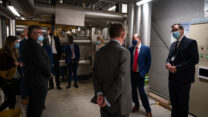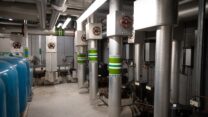Decarbonisation at the RNCM
The RNCM is leading the way in environmental responsibility within the conservatoire sector.
In 2021 we became the only Higher Education Institution in Greater Manchester to receive funding as part of the Public Sector Decarbonisation Scheme (PSDS).
- Dominic Wood (Head of Environment and Facilities) talks to Lord Callanan during the Ministerial visit.
- Dominic Wood (Head of Environment and Facilities) talks to Lord Callanan during the Ministerial visit.
- Dominic Wood (Head of Environment and Facilities) talks to Lord Callanan during the Ministerial visit.
- New equipment installed as part of the project
- Lord Callanan talks to RNCM students about our decarbonisation project
- Solar panels on the roof
- Solar panels on the roof
- Aerial view of the RNCM building
Completed in July 2022 and funded by Salix, the £6.45m project was produced in partnership with the Greater Manchester Combined Authority. Work, which will save an estimated 389 tonnes of carbon annually, lowering our energy usage by 41%, included:
Solar PV Array: With the installation of a solar PV array, combined with an efficient battery-storage system, the RNCM is able to optimise storage and purchase of electricity at off-peak rates. The roof-mounted solar panel array provides us with 14,329KWH, and is supported by a 1MW Tesvolt battery storage system.
Battery Storage: NRG Group, an installation partner of Tesvolt, designed, installed, and commissioned a 1MW battery storage system with a 300kW peak charge and discharge capacity for the RNCM. Tesvolt specialises in developing innovative, sustainable energy storage systems which represent greater environmental friendliness and energy efficiency.
Gas Boilers: The RNCM was previously utilising 12 gas-fired modular boilers, with a total output of 2400KW, to meet the building’s complete heating demand. This requirement is now greatly reduced, allowing the high-efficiency boilers to be utilised only as a backup to the new low-carbon solutions in a hybrid arrangement. The new system utilises only 6 modular boilers, each rated at 196KW, to give a total output of 1176KW, resulting in annual carbon savings of 349 tCO2e.
Air-Source Heat Pumps (ASHP) and Chiller Plant: Our hybrid ASHP system transfers heat from the outside air to water, which can then be used to heat and cool the building and provide hot water. The ASHP is now the RNCM’s primary source for heating and cooling, which it can do at the same time, being a multi pipe system. When the outside temperature is too low, making the ASHP less efficient, the recently installed high-efficiency gas boilers will be utilised as a backup energy source. The ageing chiller plant system was replaced with the latest high-efficiency units, coupled with a new heat recovery system in the form of water-to-water heat pump technology. The ‘waste’ heat that is generated from the chiller process is recovered and used to pre-heat the boiler system for the main building.
Building Energy Management System (BEMS): At the centre of this project, the BEMS enables the college to efficiently monitor and control the energy it uses to heat and cool its estate in real-time. The air-source heat pumps and chillers are sequenced and controlled by the BEMS in a fully-modulating variable heat output application for stable temperature control.









